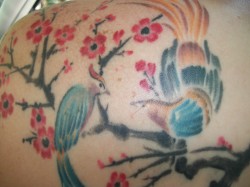The other day I had an interesting conversation with a dear friend. In passing, I mentioned that my daughter got a very beautiful tattoo. And I pulled up a picture of it I’d just taken. She didn’t even want to look at it.
“All tattoos are bad,” she said. “No matter what it looks like, I think anyone who gets a tattoo is stupid and I don’t want to have anything to do with them.” She went on to tell me how her daughter had gotten a tattoo – and didn’t even tell her about it.
I was dumbfounded… The daughter was a young adult and paid for the tattoo herself. But it caused a great deal of heartache between the mother and daughter.
mother and daughter.
I tried to reason with my friend saying, “I personally am not in favor of some of the really obnoxious tattoos. But this was really beautiful it was done by a professional artist. I reminded her that my daughter is a self-confident professional young woman. I also suggested that if another adult chooses to do something like this – and pays for it themselves – it really doesn’t affect me in any way. It doesn’t change the character or personality of the individual.
But she’d have none of it…so I changed the subject.
But this experience haunts me. I wonder if someone can help me understand.
Through the years I’ve watched people ostracized, denied work and classified as deviant just because someone else didn’t like what they did. It’s bothered me terribly to see highly intelligent, professional people prejudiced against for things that they do in their lives that don’t affect anyone but themselves.
Let’s take for example some of the most blatant of these kinds of stereotypes.
- It’s ok for a woman to pierce her ears. But our natural response to anyone piercing eyebrows, noses, lips, tongues and belly buttons is that they are freaky.
- It’s ok to have facelifts and nose jobs. The use of makeup to enhance our image is just fine – often even preferred. But many of us figure a person who chooses to get a tattoo is somehow deviant.
- It’s ok to dye grey hair – but if a person’s hair is dyed blue, green or purple, it’s absolutely unacceptable.
- Hairstyles come and go. We’ve finally agreed that men who wear beards and mustaches are ok. Longer hair – not to touch the collar – is now acceptable. But we are still opposed to guys wearing ponytails. There was a time when these hairstyles were scorned even though great men throughout history have had long hair and bears. And we won’t even discuss the reaction to such “different” styles as, say a mohawk.
- Sun lovers spend hours baking in the sun to get suntans and we actually admire them. But all those lucky people who were born with darker skin are the subject of ridicule and prejudice.
I don’t understand. What of all these practices which of them change the personality of an individual or makes them any less intelligent? Which of them make a person good – or bad? Whether we accept them or not – which has any impact on anyone but the individual?
What is it in us that automatically prejudges others based on our own personal likes and dislikes? Certainly, we can say, “I don’t particularly like that look”. Do we have the right to say a person is bad because they don’t conform with our personal idea of what is ok or because they don’t look exactly like us?
Trends come and go. People do things, sometimes, just because they want to. Do we have the right to decide that anyone who doesn’t conform to our way of thinking has no right to be recognized in polite society?
Now, I’m not saying that I’m above this kind of thinking. It took me years to learn that another’s appearance has nothing to do with their value as human beings and that this really has nothing to do with me.
To their credit, younger adults are less prone to this kind of prejudice.
Those of us who are older seem to have more difficulty. We tend to pre-judge people by how they look rather than trying to understand. Once we make a decision that we don’t like the looks of another, we don’t even attempt to get to get acquainted and discover the real person underneath. Why is this?
On the other hand, what’s considered correct or appropriate changes constantly, in spite of any stereotypes.
